In Japanese, gyaru ギャル are generally sociable young women of flashy, showy appearance, specially those following certain fashion trends, wearing gaudy accessories and makeup.
In anime, gyaru characters are normally portrayed as having unnatural dark skin and blond hair, and are associated with a number of tropes.
Anime: Saiki Kusuo no Ψ-nan 2 斉木楠雄のΨ難 2 (Episode 8)
In Japanese
The word gyaru originates in the English slang "gal," which refers to a girl. They were synonymous, but then gyaru started also referring to fashion, a meaning that "gal" doesn't have, so gyaru is practically a wasei-eigo 和製英語 now.
Fashion
The term gyaru doesn't only refer to the girls themselves: it also refers to the fashion. The word gyaru is like Emo, Gothic, Punk, etc. Besides being a look featured in a number of fashion magazines, it also has its own subculture, and stereotypes are attributed to it.
Anime: Gamers!, ゲーマーズ! (Episode 2)
Since it's fashion, that means nobody is born a gyaru. A gyaru is a gyaru because she looks like a gyaru and acts like a gyaru, so she's a gyaru. A character can become a gyaru or stop being a gyaru at any time of their lives for whatever reason.
Boy: Uehara Tasuku 上原祐
Anime: Gamers!, ゲーマーズ! (Episode 2, Collage)
- imechen
イメチェン - imeeji chenji
イメージチェンジ
"Image change."
Changing one's image. Changing one's style.
Right: Jyushiko 十四子
Anime: Osomatsu-san おそ松さん (Episode 15, Collage)
- gyaru-ka
ギャル化
Gyaru-fication. Turning into a gyaru.- This is just like the term nyotaika 女体化, "woman-body-fication," except it's about turning a character into a gyaru, and not about turning them female. Well, except that if the character is male to begin with they end up becoming female, too.
- Note: -ko ~子 is a common suffix in female names.
- aka-messhu
赤メッシュ
Red [hair] streak.
Types
There are various types of gyaru ギャル, some very different from the others. Some of them boomed and died out long ago. Some were reborn. So what a gyaru looks like has changed with history, according to whatever was the trend at the time.
But gyaru... gyaru never changes.
- egg and koakuma-ageha 小悪魔ageha are magazines associated with gyaru fashion.
コギャル
A kogyaru コギャル is a gyaru that's a "high-school student," a koukousei gyaru 高校生ギャル.
Many anime take place in high school, so, sooner or later, you'll end up seeing one of these kogyaru somewhere.
Something that kogyaru usually wear in anime is:
- ruuzu sokkusu
ルーズソックス
"Loose socks." (wasei eigo)
Socks that are "loose" in the sense they're baggy. They look like you haven't worn them right, like you're supposed to pull them up and stretch them.
They also wore relatively short skirts in the past, e.g. when compared with the sukeban スケバン female delinquents.
黒ギャル
A kuro-gyaru 黒ギャル, or "black gyaru," is a gyaru that has "dark skin."
Although it could refer to a gyaru that whose skin is naturally dark, in Japan most people have natural white skin, so in practice it refers to a girl who has made her skin dark through artificial means, like:
- Getting a "tan," hiyake 日焼け, at the beach or pool.
- Or in artificial "tanning salon," hiyake-saron 日焼けサロン.
- Or a fake tan, applying cream or spray.
Anime: Oshiete! Gyaruko-chan おしえて! ギャル子ちゃん (Episodes 2, 7, 3, Collage)
- Episode 2: Galko-chan in her natural white skin.
- Episode 7: tanned after going to the pool.
- Episode 3: tanned after going to a tanning salon.
ガングロギャル
A ganguro-gyaru ガングロギャル is a gyaru that has ganguro ガングロ, which means artificial "dark skin." This sounds like it's the same thing as a kuro-gyaru, but it isn't.
The key difference between kuro-gyaru 黒ギャル and ganguro ガングロ is that kuro-gyaru is about getting dark skin for the sake of having dark skin, while ganguro is about getting dark skin for the sake of having the rest of the makeup to stand out more.
This means a ganguro-gyaru will wear heavy makeup and colored hair, etc. on top of the dark skin, while a kuro-gyaru might not.
Furthermore, since ganguro is focused on the makeup on the face alone, you don't need to make your whole body dark in order to get it. Some gyaru use black foundation (cosmetics) to get a black face, while keeping the rest of their body in natural white color. That counts as ganguro but doesn't count as kuro-gyaru.
Anime: Nyan Koi! にゃんこい! (Episode 2, Rotated)
There are terms for different levels of ganguro according to how dark the gyaru's skin becomes:
- ganguro ガングロ
- gonguro ゴングロ
- bachiguro バチグロ
- oniguro オニグロ
マンバ
A manba マンバ is a gyaru with ganguro and a very peculiar kind of makeup. Over the black face, they use a white lip gloss, mascara, highlighter (on nose), and sometimes a thick combination of black and white eyeliner and eyeshadow that looks more like war face paint than normal makeup. Also, they have colored hair.
Anime: Nyan Koi! にゃんこい! (Episode 2)
ヤマンバ
A yamanba ヤマンバ is a gyaru style just like the manba, but they have white hair instead.
- manba piisu
マンバ・ピース
A "peace" hand sign done like an "okay" hand sign, but with only the little finger and ring finger, and on the horizontal.
The style is supposed to mimic the monster spirit yamauba 山姥, which takes form of an "old woman," babaa ババァ, and lives in a "mountain," yama 山. Since it's an old woman, it has white hair.
Historically, it seems that in 1999, the yamanba style was born just to die out soon later. It was then reborn as the more popular manba. And there might have been a number of small differences between the two that nobody really remembers anymore, so manba and yamanba started being used interchangeably.
白ギャル
A shiro-gyaru 白ギャル, or "white gyaru," is the opposite: a gyaru with white skin. In other words, a gyaru without ganguro.
Basically, the dark skin makeup was so popular at a time that gyaru was practically synonymous with ganguro. Some gyaru got sick of it: all this dark skin stuff. So the shiro-gyaru style was a counter-culture attempt at breaking free of the ganguro thing.
- bihaku
美白
"White beauty." Skin whitening in fashion.
A key difference between ganguro and shiro-gyaru is that ganguro tends to use heavier makeup: the dark skin helps contrast more vivid colors.
A shiro-gyaru may use "bleach," buriichi ブリーチ (not the shounen manga, I'm talking about cosmetics here), to make their hair lose color and make it approach blonde, which is a whiter color than the black hair Japanese people naturally have.
姫ロリ
The term hime-rori 姫ロリ is an abbreviation of "princess lolita," in the sense of "lolita fashion," roriitaa fasshon ロリータ・ファッション, like "gothic & lolita," gosshiku ando roriita ゴシック・アンド・ロリータ.
A hime-rori gyaru, or just hime-gyaru 姫ギャル, "princess gyaru," dresses like a princess, but in a romantic sense. Wearing dresses with ribbons, lace, frills, in light pink or light blue, that sort of stuff. Basically, imagine one of those traditional cutesy princess dolls made as toys for little girls. That's the look.
It seems in the past this was called romanthikku-kei ロマンティック系, "romantic-class." I suppose fashion is a fleeting thing.
Tropes
In anime targeted at otaku オタク, specially those with an anti-social protagonist, gyaru characters are considered to be the enemy "normies," riajuu リア充, and thus generally deeply despised.
Anti-social characters are often depicted monologuing awful things, and seeing a gyaru, they'll probably call her a "slut," bitch ビッチ, or a "female (animal)," mesu メス, simply for socially hanging around with guys or having a kareshi 彼氏, "boyfriend."
Matching this "slut" stereotype, gyaru characters tend to have "huge breasts," kyonyuu 巨乳. Obviously, if you're attractive you can't be smart—that's illegal—so gyaru tends to be dumb. They're basically the Japanese variant of a dumb blonde joke.
Anime: Oshiete! Gyaruko-chan おしえて! ギャル子ちゃん (Episode 3, Stitch)
- About 50% of this anime was about the size of her breasts. I'm not even joking.
The gyaru characters tend to be more romantically assertive (nikushokukei 肉食系) compared to the average female character. Looking at it from another angle, they're thought to be "less pure" than the "maiden," otome 乙女, stereotype that the average female characters fits in.
Even though most high school characters somehow have never kissed anybody, a gyaru character is always assumed to have kissed a lot already. In fact, a gyaru is assumed to have already had sex with not one, but with a bunch of guys, despite the fact her class is full of virgins.
In some anime, there are even jokes about the possibility of a gyaru doing enjo-kousai 援助交際, which is paid dating (a.k.a. prostitution) involving underage girls (a.k.a. a crime.)
Scenes involving some adult character opening the door of their car to a high school girl often ends up in a third character witnessing it and getting the wrong idea. The word papa パパ, which is, surprisingly, a common way to refer to one's "dad" in Japanese, may also be mistaken for a sugar "daddy," which is a man who pays an younger woman for company or sexual favors.
Furthermore, gyaru, like other riajuu characters, tend to be depicted as vapid, and followers of the mob rule. It's not uncommon for them to hang around with a group of friends who, empowered by their numbers, mock, make fun, and laugh together at others, specially at the lone, introverted characters.
Nastier depictions ultimately include bullying.
Since a gyaru is stereotyped into someone who likes to "have fun" around and has bad grades, they also end up being accompanied by "delinquents," yankii ヤンキー, furyou 不良. Which are bad influences.
Which means gyaru end up doings things that cool kid don't do: namely smoking cigars inside a school toilet's stall so they aren't caught by the teachers, or, in worse cases, drugs.
Slangs
In anime, gyaru characters often speak in a way different from the average character, despite very likely being just a normal high school student like everybody else.
For reference, a list of non-prescript words they use. Note that this is just a way of speaking and many non-gyaru characters speak like this too.
- ssho
っしょ?
Is it? [Isn't it?]- Relaxed pronunciation of desho でしょ.
- jan
じゃん
Isn't it?- jane
じゃね - From janai じゃない.
- Often used to ask if something "isn't it?" In the sense of asking the listener to agree.
- kawaii jan
可愛いじゃん
It's cute, isn't it? (say it's cute!)
- jane
- ttsu no
っつの
(used when asserting the previous statement as true.)- A contraction of tte iu no っていうの.
- The tte iu is used to quote what she just said, the no ending particle is assertive. E.g.
- muri ttsu no 無理っつの
It's impossible. (is what I'm telling you!)
- ttsu ka
っつか
I mean... Or rather...- A contraction of tte iu ka っていうか.
- Same thing as above, but with the doubt particle ka. E.g.
- muri ttsu ka
無理っつか
I mean, it's impossible. - ttsu ka sore muri ssho?
っつかそれ無理っしょ?
Or rather, that's impossible, isn't it?
- ttsu ka sa
っつかさ
I mean, you know...- Same as above, but with sa さ added to it, which asks the listener to consider what's being said.
- ttsu ka sa, sore muri jane?
っつかさ、それ無理じゃね?
I mean, you know, isn't that impossible?
- sunna
すんな.
Don't do.- A contraction of suru na するな.
- kunna
くんな
Don't come.- A contraction of kuru na くるな.
- saasen
さーせん
Sorry.- From sumimasen すみません.
- chiissu
ちーっす
Good day. (greeting expression.)- From konichiwa desu こんにちはです
- azaasu
あざーす
Thanks.- azassu
あざっす - From arigatou gozaimasu ありがとうございます
- azassu
- kimo
キモ
Gross. Cringe. Disturbing.- Or kimoi キモイ, from kimochi warui 気持ち悪い.
- Often used to call someone "gross" for being a nerd or for hitting on her.
- otsu
乙
Good job. Thank you for your work.
(used at the end of the day, after someone finishes their job.)- From otsukaresama お疲れ様.
- uzai
ウザい
Annoying.- From uzattai うざったい, but means the same thing as urusai 煩い.
- maji uzai desu kedo
マジウザイですけど
[You're being] seriously annoying, though.
Go away. Get lost.
Some slangs:
- gachi
ガチ
Serious. Seriously. Really.- As opposed to joking around. Someone is serious about it. Synonymous with:
- honki
本気
Serious. - gachi-koi
ガチ恋
Serious love. (they're for real.)
- maji
マジ
Seriously. Really.- Used when something is unbelievable.
- Seriously? That happened? Really?
- That guy is seriously cool!
- But also used as a generic intensifier before literally anything.
- hontou 本当
Real. - hontou ni 本当に
honto ni ホントに
Really.
- chou
超
Super.- Used as intensifier.
- yabai
やばい
Dangerous.
Terribly.
Amazing.- Originally, it meant "dangerous," like something you should stay away from.
- Somehow, it became synonymous with sugoi すごい, which is an intensifier and can mean something is incredibly so, or terribly so, or amazingly so, etc.
- maji yabaku ne?
マジやばくね?
"Isn't it seriously yabai?"- The phrase above is basically an intensifying adverb plus an intensifying adjective. It just means something is intense somehow, but it doesn't mean good or bad. Thus, it's become a generic way to agree with someone, lacking any actual meaning whatsoever.
- ukeru
ウケる
To make [me] laugh.- This is verb is often used when mocking something or someone. It essentially calls the thing funny, but it's a verb, so the grammar is kind of weird. Basically, it comes from:
- ukeru
受ける
To receive. - In the sense of you received it well, it's well-received by you, the joke made you laugh, the person (who's a joke) made you laugh, and so on.
- It can also mean something is impressive is a non-mocking sense. That you approve of it.
- The reason it's often used mockingly is because, in anime, a gyaru is in a group, someone in the group starts making fun of a third character, and the gyaru says ukeru expressing she approves of the mockery, she thinks it's funny.
- maji ukeru
マジウケる
"Super funny." (or something like that.)- chou ukeru
超ウケる
- chou ukeru
- panee
パネェ
Thorough. (serious, not to be underestimated.)- panai
パナイ - hanpa
半端
Half-way. Half-hearted. - hanpa janai
半端じゃない
Someone who's not half-hearted or something that's not done half-way. In other words: something 100% serious and thorough.- Variations:
- hanpa janee
半端じゃねぇ - hanpanai
半端ない - hanpanee
半端ねぇ
- And from that you get panai and panee.
- maji panee
マジパネェ
It's seriously thorough. (not to be trifled with.)
- panai
Some slangs used on the internet:
- JK
Short for joshi kousei 女子高生, "high school girl." - wwww
lol. rofl. (used when laughing at a joke, etc.) - maji manji
マジ卍
Seriously "manji."- The "swastika," manji 卍, was originally used as a tag (like, graphite) by delinquents, so it became associated with bad guys, and then, just like yabai, what's dangerous became amazing.
- Long story short: maji manji doesn't really mean anything. It's an intensifier like yabai. It can be "wow" or "amazing" or "horrible" depending on the situation.
- chou チョ→
(from choo ちょー, same as chou ちょう.)- chou kawaii
チョ→かわいい
Super cute.- chou kawaii
超かわいい
- chou kawaii
- choudai
チョ→ダイ
Give to me. Do for me.- choudai
頂戴
- choudai
- chou kawaii
- Context: gyaru Mai-nyun まいにゅん unleashes her ultimate technique on sukeban Kamio Yui 神緒ゆい.
- yankii gyaru ougi
ヤンキーギャル奥義
Delinquent gal secret technique. - maji-manji-gatame
マジ卍固め
Serious swastika hold.- manji-gatame
卍固め
Swastika hold. (literally.)
Octopus hold. (English name for the same wrestling technique.) - This is the skill that Mai-nyun acquired after arduous training as a gyaru. Don't ask me what in the world that training was. I have absolutely no idea.
- Unlike the normal manji-gatame, which targets only a few vital spots, the maji-manji-gatame targets 109 vital spots, according to the manga.
- This number, 109, pronounced maru-kyuu, literally "circle nine," with "circle" being a way to say "zero" when spelling out numbers, is in reference to the iconic department store in Shibuya 渋谷, the Ichi-maru-kyuu 109, which is a tower with a red 109 written on it.
- manji-gatame
Some words that aren't exactly slangs but you may end up seeing them anyway:
- asobi
遊び
Play.- Any activity that's about having fun. Hanging out, etc.
- asobu
遊ぶ
To play.
- nanpa
ナンパ
Hitting on [girls]. Flirting.- Abbreviated nan ナン.
- nanpa sareta
ナンパされた
To be hit on. - gyaku-nanpa
逆ナンパ
Reverse nanpa. Girls hitting on guys.
- dekoru
デコる
To decorate.- With stickers and stuff like that.
- meiku
メイク
Makeup. - suppin
素っぴん
Not wearing makeup.- For example, if a kuro-gyaru has ganguro on her face alone—she wears a black foundation—then you'd see her natural, white face if she was suppin.
- sugao
素顔
Face without makeup. (synonym.) - See ガングロギャルのスッピン - buzzfeed.com for reference.
- piasu
ピアス
Piercing.- Refers only to a piercing, the thing.
- akeru
開ける
To open. (a hole, a piercing.) - It's abbreviated pi ピ, often comes after body parts.
- shita-pi
舌ピ
Tongue piercing.
- tatwuu, or irezumi
タトゥー, 入れ墨, 刺青
Tattoo.
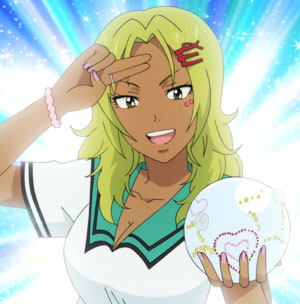
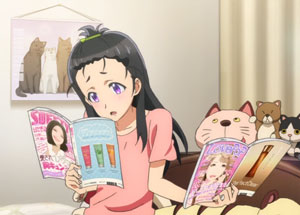
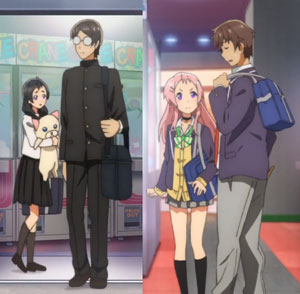
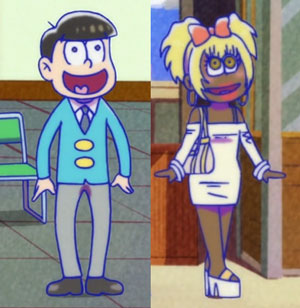
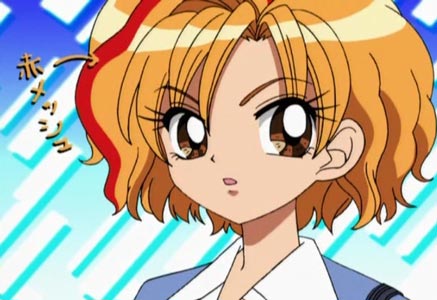
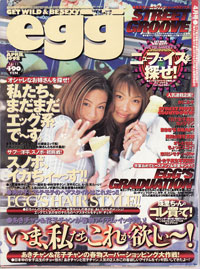
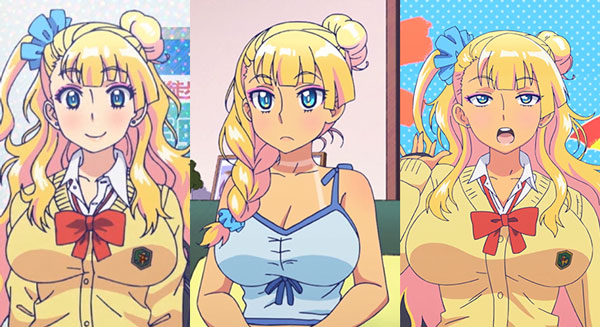
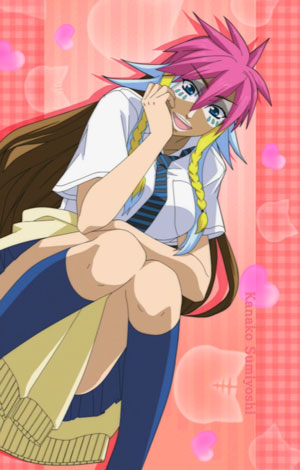
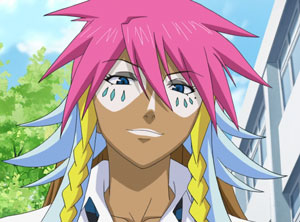
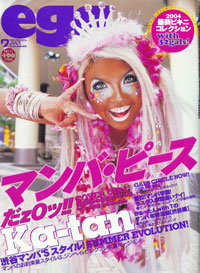
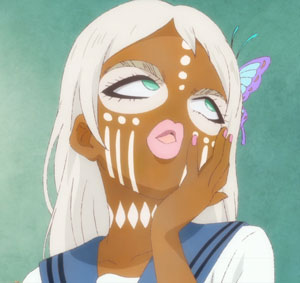
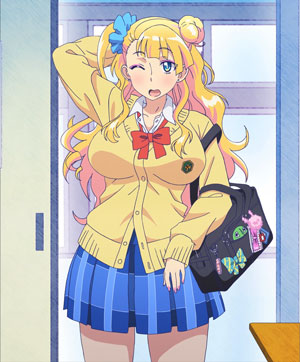
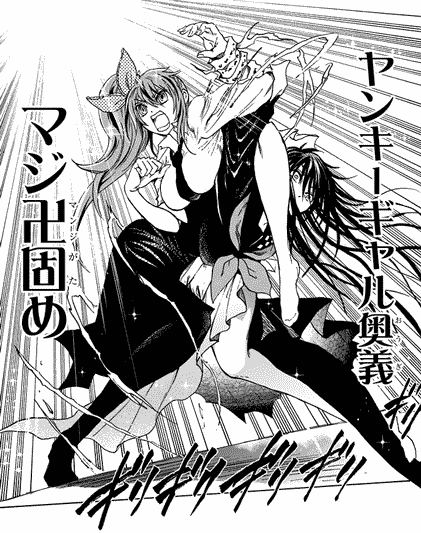
No comments: